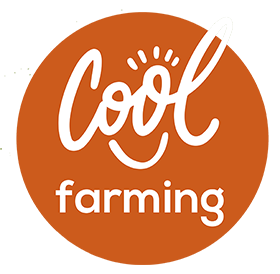Cool Farming
Solutions
Cool Farming uses a series of sustainable farming practices that help store carbon from the atmosphere in agricultural soil, they also prevent the greenhouse effect and improve farm productivity.
We propose a series of "regenerative farming" techniques so that a farm can optimize carbon sequestration in its agricultural land. By applying these practices, CO2 is absorbed from the atmosphere and stored in the form of plant and organic material in the soil.
Carbon Farming is used as a synonym for the term "regenerative agriculture" when it is explicitly based on improving soil fertility and farm productivity. In Cool Farming we go further, as we also manage to make agricultural soil more efficient in terms of production.

GLOBAL CLIMATE IMPACT
There are two major issues influencing global climate impact:
- The climate impact due to the increase of CO2 emissions into the atmosphere.
- The increase in production needed to feed the growing world population (the United Nations forecasts that the world population will reach 8.5 billion by 2030 and 9.7 billion by 2050).
WE CAN SOLVE THESE TWO BIG PROBLEMS SIMULTANEOUSLY with our system called "Cool Farming". We have created the term "Cool Farming" to encompass all activities contemplated in Carbon Farming that help solve these two major problems simultaneously.
COOL FARMING establishes methods that absorb CO2 from the atmosphere while producing food to feed the population. Join us and be part of the change to live in a more sustainable world with the necessary resources to feed the entire population.
FOOD SECURITY AND POPULATION
We have been aware for years of the great challenge we face with climate change. In a few years, the increase in population will mean that we will have to increase food production by up to 70%. At cool farming, we have the tools to keep the situation from getting worse.
One billion people lack adequate access to food. Addressing this situation requires intelligent changes to the food system. Population control is not the answer.
The United Nations expects the world population to increase by 2 billion people in the next 30 years, from 7.7 billion today to 9.7 billion in 2050, with a potential peak of nearly 11 billion by 2100.
Research by international agencies proposes several ways to ensure food security for the global population without resorting to population control measures. These include increases in the production and availability of healthy food through the improvement in agricultural practices and systems, the implementation of systems that conserve natural resources and biodiversity, and changes in crop cultivation.

AGRICULTURAL PLANTATIONS TO SAVE THE PLANET
We know that agriculture is the solution and in our fields, there are valuable tools to carry it out: vegetation and soil.
Plants trap the CO2 they feed on and transport carbon underground. Farms have 85% of the total carbon dioxide absorption potential.
Our goal is to create food and farming systems that can adapt and be resilient to climate change, and at the same time we aim to help farmers implement practices that reduce heat-trapping emissions, and protect soil quality, air, water and biodiversity.

